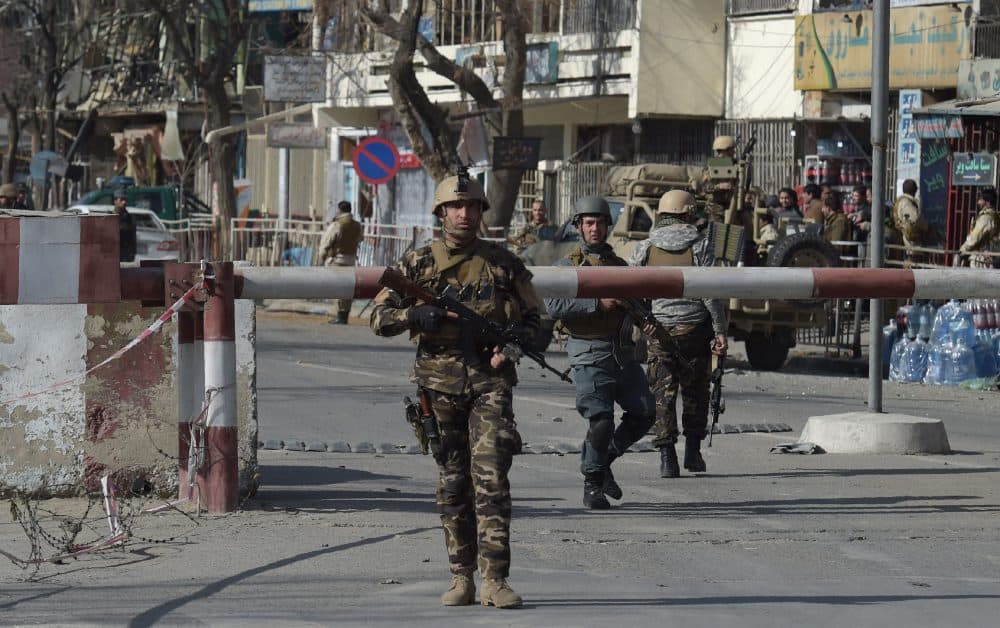Advertisement
Pakistan Doesn't Want 'Any Violence Or Terrorism In Afghanistan,' Ambassador To U.S. Says
Resume
A spate of deadly attacks in Afghanistan has left more than 200 people dead in the last month. Afghan officials said Thursday that the attackers were trained in Pakistan, where, they said, Taliban leaders roam free. President Trump, in his first tweet of the year, made similar claims.
Here & Now's Jeremy Hobson speaks with Aizaz Ahmad Chaudhry, Pakistan ambassador to the U.S., about the claims, and Pakistan's relationship with the Trump administration.
Interview Highlights
On those blaming Pakistan for recent deadly attacks in Afghanistan
"We condemn those attacks, the innocent lives [that] have been lost. Our foreign minister was in the Afghan Embassy in Islamabad, and we commiserate with the people and government of Afghanistan. But we also would like to express our disappointment that anything that happens in Afghanistan, no matter what, the only reaction that we hear from Kabul is to blame Pakistan, and I think externalizing your own problems will not help that government deal with the issue at hand."
"We are the only country that will benefit the most — apart from the people of Afghanistan — if peace returns to Afghanistan."
Aizaz Ahmad Chaudhry, Pakistan ambassador to the U.S.
On whether Pakistan bears some blame for the attacks
"Absolutely not. Pakistan does not want any violence or terrorism in Afghanistan. In fact, we have suffered from the instability in Afghanistan. We are the only country that will benefit the most — apart from the people of Afghanistan — if peace returns to Afghanistan. Why would we support any element that would destabilize Afghanistan, and in turn bring that instability to Pakistan?"
On a solution to the violence in Afghanistan
"I think the solution is to have a comprehensive political approach, and engage in a genuine political dialogue between all Afghan factions. We don't want to be party to it. We think that it should be between Afghan government and all Afghan factions, the Taliban must be made to be part of that process. We tried it twice. We did it once in 2015, the second time, the four nations — Pakistan, Afghanistan, the United States and China — came together, and we set out to meet all the Taliban, all of us four, to persuade them that they must give up violence. The Taliban leader was killed in a drone strike. So I think the Taliban are not ready to listen to Pakistan, that our influence on them has eroded because twice we brought them with whatever influence we had, and now they are leaving our country and we have that much less influence on them."
On Pakistan's relationship with the U.S., and Trump's tweet saying the U.S. has "foolishly" given Pakistan aid
"We would like to have good relations with the United States, there is no doubt about it. The two countries have worked together for seven decades, and we think it would be a mistake to squander that relationship. Both countries have benefited from that relationship. And if that relationship goes down, I think both countries are going to lose.
"The tweet, it was received with great disappointment, because Pakistan and the United States have worked together for such a long time, and to mire it only in terms of dollars and cents was an unfair treatment. And a surprise, because we were already having conversations with the U.S., Secretary [of Defense James] Mattis was in Pakistan, Secretary [of State Rex] Tillerson was in Pakistan. We were having those conversations. The idea was, to use the words of Secretary Mattis, find that common ground where two countries have to work. I think the direction should be to find common grounds, and not engage in a coercive or a disrespectful relationship. Pakistan believes in a relationship which would be based on mutual respect and mutual trust, and I think that's where the future should lie."
This article was originally published on February 02, 2018.
This segment aired on February 2, 2018.